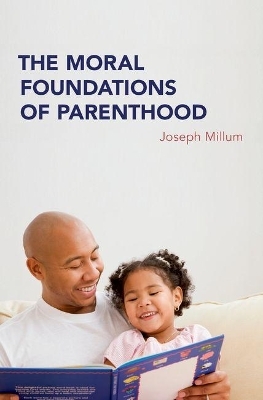
The Moral Foundations of Parenthood
Seiten
2018
Oxford University Press Inc (Verlag)
978-0-19-069543-9 (ISBN)
Oxford University Press Inc (Verlag)
978-0-19-069543-9 (ISBN)
In this book, Joseph Millum explains how parental rights and responsibilities are acquired, what they consist in, and how parents should go about making decisions on behalf of their children. In doing so, he provides a set of frameworks to help solve pressing ethical dilemmas relating to parents and children.
Most people believe that parents have moral rights and responsibilities regarding their children. These rights and responsibilities undergird the nuclear family and are essential to the flourishing of its members. However, their basis and contents are hotly contested. Do a child's genetic parents have a right to parent her? The importance of genetic ties is affirmed by many people's gut responses, everyday talk, and many court decisions, but the moral justification for tying parenthood rights to genetics is unclear. Parents are routinely permitted to make far-reaching decisions about their children's medical care, education, religious practice, and even how to punish them. When can parental rights be limited by the interests of the child or society?
Matters are no more settled when it comes to parental responsibilities. It is commonly thought that if a man conceives a child through voluntary sexual intercourse he acquires parental responsibilities, even if he took every precaution against conception. On the other hand, sperm donors are widelythough not universallythought to have no responsibilities towards their progeny. What is the basis for these disparate judgments? Parents are expected to do a lot for their children as they raise them. But there are surely limits. Sometimes parents have to balance the needs of multiple family members or just want to have time for themselves. What is the extent of their parental responsibilities?
In The Moral Foundations of Parenthood, Joseph Millum provides a philosophical account of moral parenthood. He explains how parental rights and responsibilities are acquired, what those rights and responsibilities consist in, and how parents should go about making decisions on behalf of their children. In doing so, he provides a set of frameworks to help solve pressing ethical dilemmas relating to parents and children.
Most people believe that parents have moral rights and responsibilities regarding their children. These rights and responsibilities undergird the nuclear family and are essential to the flourishing of its members. However, their basis and contents are hotly contested. Do a child's genetic parents have a right to parent her? The importance of genetic ties is affirmed by many people's gut responses, everyday talk, and many court decisions, but the moral justification for tying parenthood rights to genetics is unclear. Parents are routinely permitted to make far-reaching decisions about their children's medical care, education, religious practice, and even how to punish them. When can parental rights be limited by the interests of the child or society?
Matters are no more settled when it comes to parental responsibilities. It is commonly thought that if a man conceives a child through voluntary sexual intercourse he acquires parental responsibilities, even if he took every precaution against conception. On the other hand, sperm donors are widelythough not universallythought to have no responsibilities towards their progeny. What is the basis for these disparate judgments? Parents are expected to do a lot for their children as they raise them. But there are surely limits. Sometimes parents have to balance the needs of multiple family members or just want to have time for themselves. What is the extent of their parental responsibilities?
In The Moral Foundations of Parenthood, Joseph Millum provides a philosophical account of moral parenthood. He explains how parental rights and responsibilities are acquired, what those rights and responsibilities consist in, and how parents should go about making decisions on behalf of their children. In doing so, he provides a set of frameworks to help solve pressing ethical dilemmas relating to parents and children.
Joseph Millum is a bioethicist working at the Clinical Center Department of Bioethics and the Fogarty International Center, National Institutes of Health. He received his Ph.D. in Philosophy from the University of Toronto. Dr. Millum is co-editor of Global Justice and Bioethics (Oxford 2012) and co-author of Research Ethics Consultation: A Casebook (Oxford 2012).
Chapter 1. Accounting For Moral Parenthood
Chapter 2. The Acquisition of Parental Rights
Chapter 3. The Content of Parental Rights
Chapter 4. The Acquisition of Parental Responsibilities
Chapter 5. The Content of Parental Responsibilities
Chapter 6. Parental Decision-making
| Erscheinungsdatum | 15.02.2018 |
|---|---|
| Verlagsort | New York |
| Sprache | englisch |
| Maße | 239 x 155 mm |
| Gewicht | 680 g |
| Themenwelt | Geisteswissenschaften ► Philosophie ► Ethik |
| Medizin / Pharmazie ► Medizinische Fachgebiete ► Medizinethik | |
| Studium ► Querschnittsbereiche ► Geschichte / Ethik der Medizin | |
| Naturwissenschaften ► Biologie | |
| ISBN-10 | 0-19-069543-9 / 0190695439 |
| ISBN-13 | 978-0-19-069543-9 / 9780190695439 |
| Zustand | Neuware |
| Informationen gemäß Produktsicherheitsverordnung (GPSR) | |
| Haben Sie eine Frage zum Produkt? |
Mehr entdecken
aus dem Bereich
aus dem Bereich
Die Geschichte eines Weltzentrums der Medizin von 1710 bis zur …
Buch | Softcover (2021)
Lehmanns Media (Verlag)
CHF 27,90
von der Antike bis zur Gegenwart
Buch | Softcover (2024)
C.H.Beck (Verlag)
CHF 16,80
Geschichte der Bioethik in Deutschland
Buch | Hardcover (2025)
Suhrkamp (Verlag)
CHF 109,15


